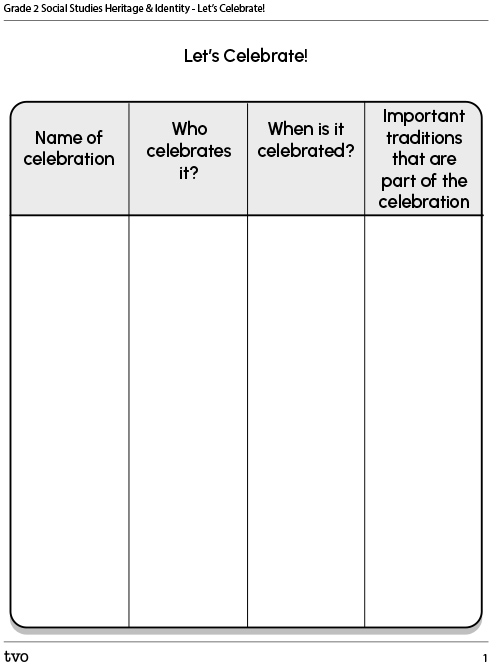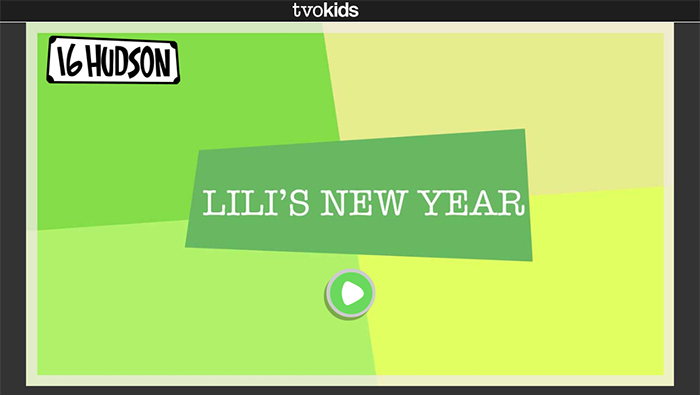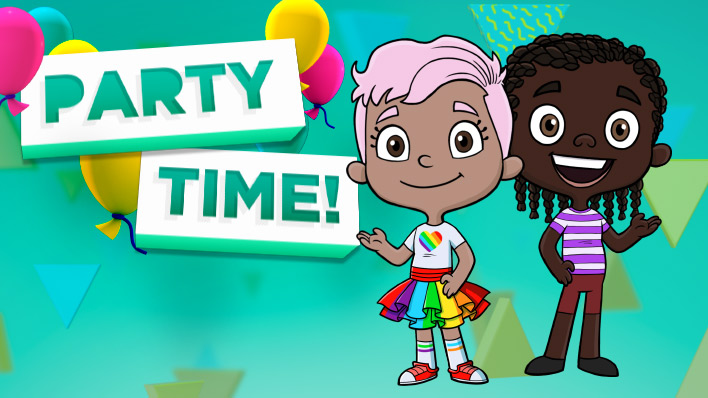Minds On
Family fun time
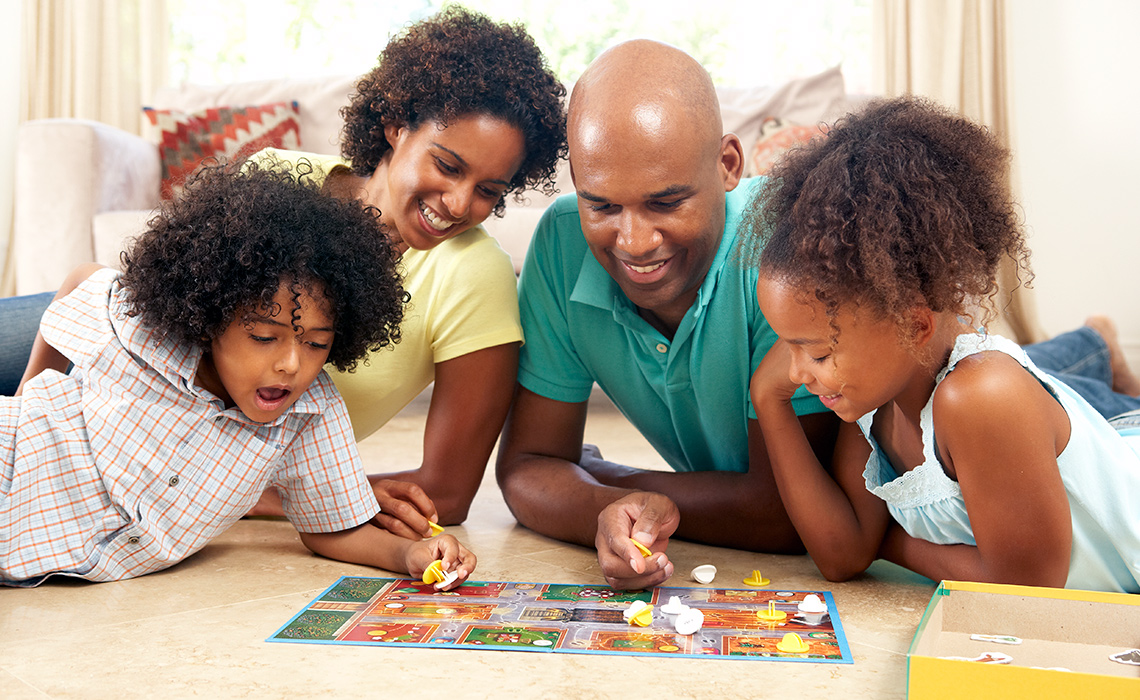
Press the following tabs to explore how families can have fun together!
Brainstorm
Let the good times roll!
What are some activities that families might do to have fun together?
Throughout this activity, you can record your ideas on the computer, orally, or on paper.
Action
What is a celebration?
A celebration is when you do something special for an event or a holiday.
Each family has their own ways to have fun or celebrate occasions like birthdays and holidays. How they celebrate is not the same from family to family.

Student Tips
Did you know?
Not everyone celebrates the same event the same way.
Press Family Fun to reveal an example!
Task 1: My family has fun!
- Choose something special or a family celebration that your family does.
- Describe your family activity.
- You can create a picture or two if you like.
Complete the Family Celebration or Special Event activity in your notebook, using the following fillable and printable document, or using a tool of your choice.
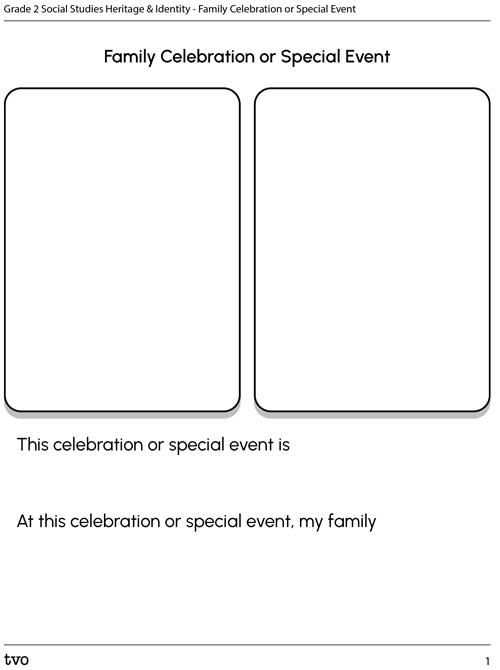
Press the Activity button to access the Family Celebration or Special Event.
Activity(Opens in a new tab)Task 2: Celebrations

What is a celebration that your family participates in? Why is it important to you?
In this activity, you will learn about various celebrations and choose one that you would like to explore. For example, it could be one that your family, friends, or community celebrates. It can also be one that you would like to know more about.
There could be more celebrations that are not listed in this section. You could explore one of those celebrations as well.
While you explore the celebration, take note of:
- Who celebrates it?
- What is the celebration called?
- When is it celebrated?
- What are some important traditions associated with the celebration?
You can record your ideas using your notebook, the following fillable and printable Let's Celebrate! document, or use another method of your choice.
If you would like some help, press Example to reveal a model of how to complete your task.
Let’s Celebrate model
| Name of celebration | Who celebrates it? | When is it celebrated? | Important traditions that are part of the celebration |
|---|---|---|---|
| Example: Name of celebration. | Celebrated by (Blank) around the world. | Changes every year because of (Blank). Happens in the month of (Blank). | People celebrate during the month of (Blank). Enjoy a feast with (Blank) to mark the day. |
Seasonal celebrations
There are certain times in the year that families and communities celebrate. Here are some examples of some celebrations by season.
Winter celebrations
Press each celebration to see some examples of celebrations that happen between December 21st and March 21st every year.
Hanukkah is a Jewish celebration that is often called the Festival of Lights. This video will help you learn more about the celebration:
This is a Christian celebration that is held in many countries on December 13. In Sweden, Finland, and Norway, St. Lucia Day (also known as St. Lucy's Day) is celebrated with candles, a feast, and special clothing.

This is an important celebration in the Caribbean country of St. Lucia. Explore the following video to learn more about this special day!
This is a Christian holiday that takes place on December 25th. It celebrates the birth of Jesus, which is an important part of the Christian faith. Christmas includes the giving of gifts and the decorating of a Christmas tree. A large meal is often served on Christmas.

This is an African American and African Canadian celebration from December 26th to January 1st.
This video will help you learn more about the celebration:
This is a Japanese celebration for the New Year. It is celebrated on January 1st. This video will help you learn more about the celebration:
This is a harvest festival for Hindu people from South India. This video will help you learn more about the celebration:
This is celebrated by many communities and celebrates the shortest day of the year. This video will help you learn more about the celebration:
This is festival held by communities from India, Pakistan, and Nepal. It celebrates the beginning of spring, usually in February. The skies are filled with colourful kites and yellow ribbons. Often people wear yellow clothes during this festival.

This is a Scottish holiday that is named after a Scottish poet. This video will help you learn more about the celebration:
Spring celebrations
Press each celebration to see some examples of celebrations that happen between March 21st and June 21st every year.
This is a Hindu and Sikh festival that celebrates the end of winter. This video will help you learn more about the celebration:
This is Thailand’s most famous festival that happens over three days from April 13th to April 15th. It is a water festival to celebrate the Thai New Year. Those who are celebrating get others wet and spend time with their families.

This is celebrated by Italians from Venice. This video will help you learn more about the celebration:
Easter is a Christian celebration and holiday. It celebrates Jesus rising from the dead. Today, Easter is often celebrated with egg hunts and family gatherings that include a large celebration and a meal.

This is an Iranian festival that is also known as the Persian New Year. It is celebrated at the beginning of Spring. It includes music, dancing, food, traditional clothes, and singing.
You can learn more about this celebration by accessing Lili's New Year from TVOkids.
Summer celebrations
Press each celebration to see some examples of celebrations that happen between June 21st and September 21st every year.
This is a Swedish and Finnish holiday. This video will help you learn more about the celebration:
This is a Japanese Buddhist festival that takes place for three days in the summer. During this festival people welcome the spirits of their ancestors back home. It is celebrated with family.

This is a day to celebrate Indigenous heritage on June 21st. This video will help you learn more about the celebration:
This is the ninth month of the Islamic calendar. The dates change every year, but it always lasts one month. This is a time for Muslims to fast (not eat) during the day, pray, and reflect with community members.
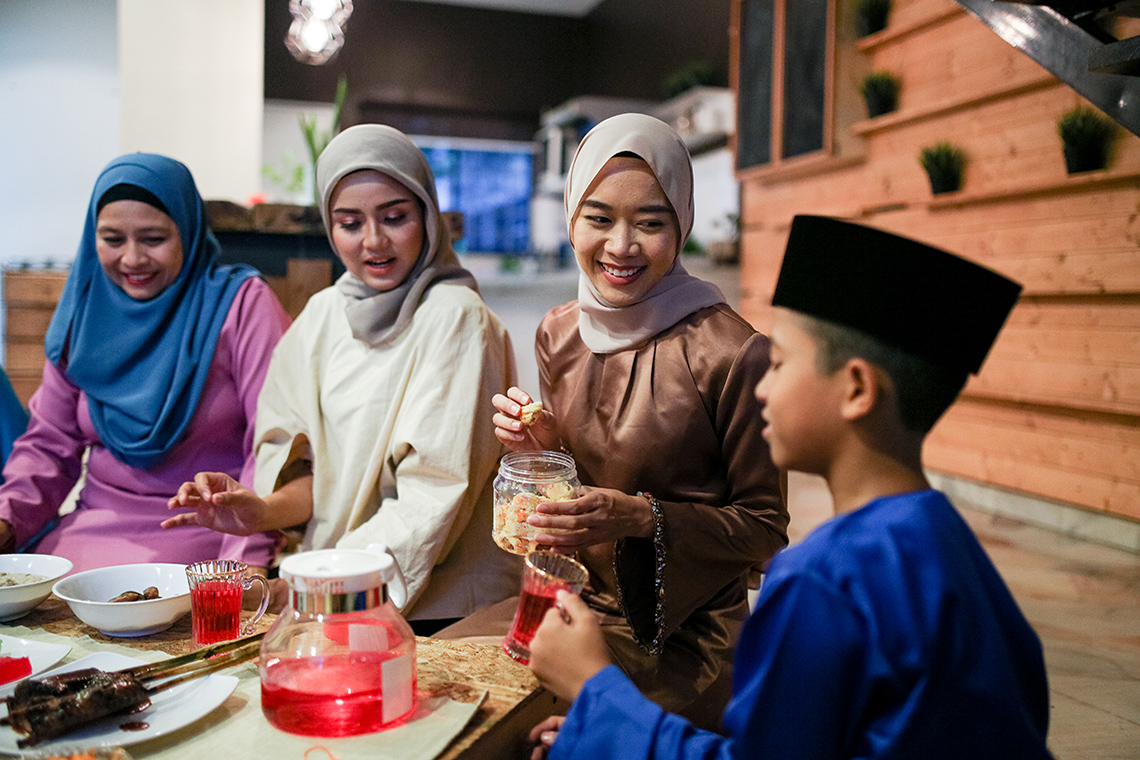
This is a Muslim religious holiday that celebrates the end of Ramadan. This video will help you learn more about the celebration:
Autumn celebrations
Press each celebration to see some examples of celebrations that happen between September 21st and December 21st every year.
This is the Jewish New Year and is also called the Feast of Trumpets. It lasts for two days in September. There is candle lighting, horn blowing, and a large meal with family.

This is a Mexican celebration filled with mariachi music, food, and Spanish performances to honour people’s ancestors who have died. This video will help you learn more about the celebration:
This is a Chinese festival held for one day in the middle of Autumn. It is a day for family gatherings when the moon rises. Together they may eat moon cakes and sing moon poems.

This festival is all about Greek pride and includes a parade, dancing, and a great feast. This video will help you learn more about the celebration:
This is a festival celebrated by different communities from India. This video will help you learn more about the celebration:
This is an Iranian festival that takes place 100 days before spring. This video will help you learn more about the celebration:
Consolidation
Happy New Year!
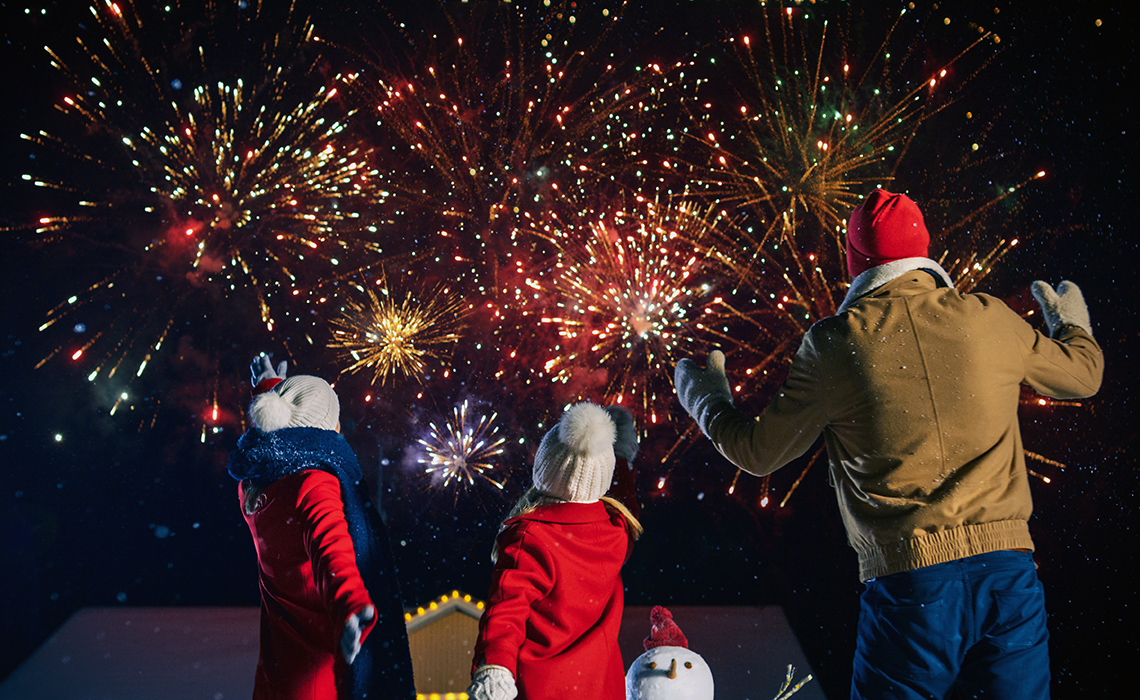
Student Tips
Keep in mind
Family traditions are not always the same, even among families celebrating the same holiday or celebration.
Option 1: Ways to celebrate New Year
Does your family celebrate New Year’s Eve? If you do, what are some of the traditions that you have around this celebration?
Record your traditions using a tool of your choice.
Now you are going to compare your traditions to that of Ashley, who celebrates Lunar New Year.
We are going to explore the following video from TVOkids series, It’s My Party, to learn more about Lunar New Year.
Please fill out the following New Year Celebration Option 1 chart, use your notebook, or use a tool of your choice to examine the celebration you chose.
| Name of celebration | |
| What is the same between the celebrations? | |
| What is not the same between the celebrations? | |
| Why is it important to learn about the traditions and celebrations of other communities? |
Press the Activity button to access New Year Celebration Option 1.
Option 2: Comparing two New Year’s
In this task, we are going to compare two community’s celebrations of the New Year. This will help us to learn more about holidays and traditions that kids all over Canada celebrate.
In the first video, you will learn about Lunar New Year, which is a Chinese New Year celebration.
In the second video, you will learn about Oshogatsu, which is a Japanese New Year celebration.
As you explore the two videos, think about what is the same between the two celebrations and what is not the same.
Press Lunar New Year to learn about the Chinese New Year celebration.
Press Oshogatsu to learn about the Japanese New Year celebration.
Please complete the New Year Celebration Option 2 chart in your notebook or use the following fillable and printable document.
| Name of celebration | |
| What is the same between the celebrations? | |
| What is not the same between the celebrations? | |
| Why is it important to learn about the traditions and celebrations of other communities? |
Press the Activity button to access New Year Celebration Option 2.
Reflection
How do you feel about what you have learned in this activity? Which of the next four sentences best matches how you are feeling about your learning? Press the button that is beside this sentence.
I feel...
Now, record your ideas about your feelings using a voice recorder, speech-to-text, or writing tool.
Press Discover More to extend your skills.
Discover MoreParty Time! – Online game
Create your own party with this TVOkids online game!
You will get a chance to make your party truly yours.
You can include some holiday traditions depending on the type of celebration you want to have.
More family fun time videos!
Here are some more family fun time videos! You can explore each of the following videos for fun!
